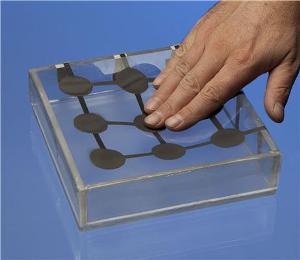When a car is racing very fast on a traffic road, a crash is likely to occur. The inflated airbag fitted in the car can protect the passengers in the car. However, the force of the inflated airbag can hurt the person is he or she is leaning forward.
 Sensors that can stretch
Sensors that can stretch
To prevent this situation, Fraunhofer Institute for Silicate Research (ISC) has developed sensors that can be fixed inside the car seat where they can detect the occupants seating position. The sensors can also monitor if the seat is vacant or occupied. They can detect whether the seat is occupied by an adult or a child and whether the person is sitting back or leaning forward.
The new sensors are produced using an elastomeric film that is extremely stretchable and coated with flexible electrodes. When the shape of the car’s seat is changed, the sensor also gets stretched. This in turn changes the thickness and the electrical capacitance of the sensor that can be measured. The dielectric elastomeric sensor has a potential to stretch to 100% in extreme situations.
Researchers have selected the polymer-based elastomer film to meet the specific needs of different applications. A tough film is used as a substrate for measuring high pressures, while flexible films are used for measuring lower pressures. The elastomeric sensors have several applications, including measuring pressure of gases. For this, the film needs to be stretched across a ring. The dielectric elastomeric sensors can also be integrated into clothing. These systems will be demonstrated at the Sensor+Test show in Nuremberg.